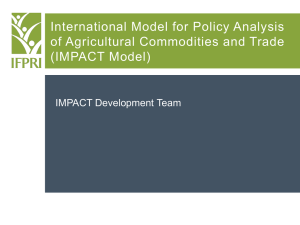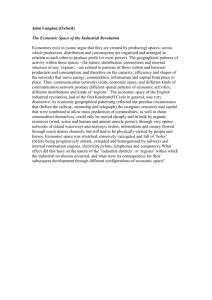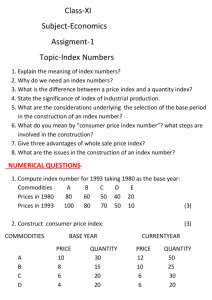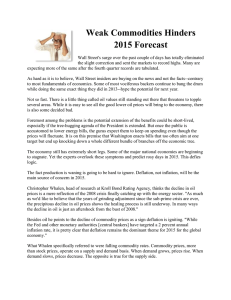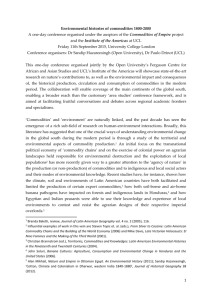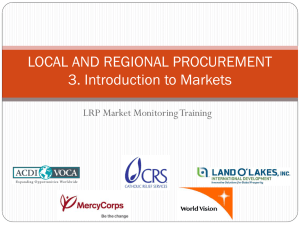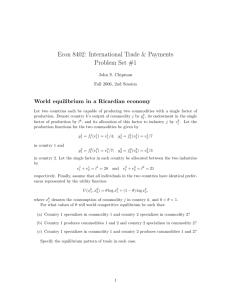Document 10577953
advertisement
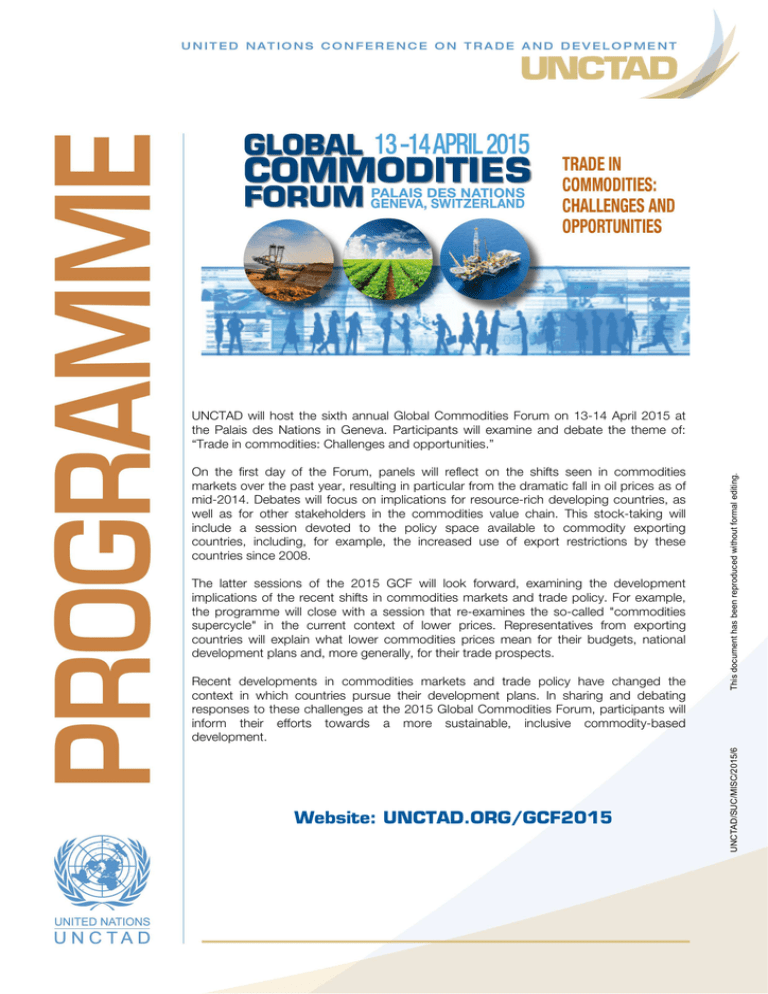
The latter sessions of the 2015 GCF will look forward, examining the development implications of the recent shifts in commodities markets and trade policy. For example, the programme will close with a session that re-examines the so-called "commodities supercycle" in the current context of lower prices. Representatives from exporting countries will explain what lower commodities prices mean for their budgets, national development plans and, more generally, for their trade prospects. Recent developments in commodities markets and trade policy have changed the context in which countries pursue their development plans. In sharing and debating responses to these challenges at the 2015 Global Commodities Forum, participants will inform their efforts towards a more sustainable, inclusive commodity-based development. Website: UNCTAD.ORG/GCF2015 UNCTAD/SUC/MISC/2015/6 On the first day of the Forum, panels will reflect on the shifts seen in commodities markets over the past year, resulting in particular from the dramatic fall in oil prices as of mid-2014. Debates will focus on implications for resource-rich developing countries, as well as for other stakeholders in the commodities value chain. This stock-taking will include a session devoted to the policy space available to commodity exporting countries, including, for example, the increased use of export restrictions by these countries since 2008. This document has been reproduced without formal editing. UNCTAD will host the sixth annual Global Commodities Forum on 13-14 April 2015 at the Palais des Nations in Geneva. Participants will examine and debate the theme of: “Trade in commodities: Challenges and opportunities.” GLOBAL COMMODITIES FORUM 2015 TRADE IN COMMODITIES: CHALLENGES AND OPPORTUNITIES Monday, 13 April (Room XXVI) Opening ceremony 10–11 a.m. Welcome remarks by H.E. Ms. Ana Maria Menéndez Pérez, Pérez Ambassador and Permanent Representative, Permanent Mission of Spain to the United Nations Office and other international organizations in Geneva, and current President of the Trade and Development Board of UNCTAD Opening statement by Dr. Mukhisa Kituyi, Kituyi Secretary-General of UNCTAD Statements from inaugural panel Mr. René Bautz, Bautz Chairman, World Energy Council–Global Gas Centre; CEO, Gaznat Mr. Yi Xiaozhun, Xiaozhun Deputy Director-General, World Trade Organization H.E. Mr. Triyono Wibowo, Wibowo Ambassador Extraordinary and Plenipotentiary and Permanent Representative, Permanent Mission of the Republic of Indonesia to the United Nations Office and other international organizations in Geneva Keynote speeches 11 a.m.–12.30 p.m. Moderator: Mr. Martin Khor, Khor Executive Director, South Centre, Geneva Mr. Yilmaz Akyuz, Akyuz Chief Economist, South Centre, Geneva: "Managing Boom-Bust Cycles in Commodity Dependent Economies" Mr. Philippe Chalmin, Chalmin President, Cyclope: "What is the new normal in commodity markets?" Moderated questions and answers 12.30–1 p.m. Lunch 1–3 p.m. 2 GLOBAL COMMODITIES FORUM 2015 TRADE IN COMMODITIES: CHALLENGES AND OPPORTUNITIES Monday, 13 April (Room XXVI) (cont.) Plenary session 1 3–4.30 p.m. Prospects for transparency-themed governance reform in the Swiss commodity trading sector* Description: The modern commodity trading sector is a recent phenomenon, its business models evolving since the 1970s to become a multi-billion-dollar industry that today controls a significant share of physical and financial flows in the commodities value chain. Unfortunately, the governance of the trading sector has not kept pace with its growth: the majority of companies are privately held and unaccustomed to engaging with the public, and no system of public disclosure exists for the transactions traders undertake. As a result, when stakeholders have raised concerns in recent years about traders' business practices and their impacts on developing countries, too little information exists to satisfactorily address the concerns and devise appropriate policy solutions. As an impediment to effective policy making, the lack of transparency in the commodity trading sector represents a significant risk to firms and to their home and host governments. Panellists in this session will debate the prospects for transparency-themed reform in Switzerland, home to many of the world's largest trading firms. This debate will include an evaluation of current initiatives and of what other steps are necessary for reform to progress. Format: Format Moderated debate Moderator: Moderator Mr. Edward Harris, Harris Head of Communications, Africa Progress Panel Mr. Olivier Bovet, Bovet Programme Manager, Swiss State Secretariat for Economic Affairs Mr. Ramon Esteve, Esteve Board Member, ECOM Agroindustrial Mr. Andrew Gowers, Gowers Head of Corporate Affairs, Trafigura Mr. Olivier Longchamp, Longchamp Responsable fiscalité et finances, Déclaration de Berne Mr. Harrison Mitchell, Mitchell Head of Due Diligence and Responsible Supply Chains, RCS Global Ms. Lyssandra Sears, Sears Legal Expert, Déclaration de Berne * this session follows the theme from a similar session at the 2014 Global Commodities Forum, but with a specific focus on the Swiss trading sector 3 GLOBAL COMMODITIES FORUM 2015 TRADE IN COMMODITIES: CHALLENGES AND OPPORTUNITIES Monday, 13 April (Room XXVI) (cont.) Plenary session 2 4.30–6 p.m. Policy space for resource-rich developing countries in the trade of raw materials Description: Since 2008, we have seen resurgence in the use of restrictions by commodity producing countries. Export restrictions are legal, but their use is contentious. OECD analysis suggests that countries employing restrictions on raw material exports have had mixed success in achieving their policy objectives, with some countries suffering net negative effects, especially over time. Moreover, OECD analysis emphasises that the net effect of export restrictions on trading partners and international markets is consistently negative. Nevertheless, governments in producing countries continue to employ export restrictions, prompting a wider examination of the role of export restrictions in producing countries' development strategies. For example, developing country governments are often counselled to adopt holistic development strategies, so it is unsurprising that some producing countries choose to coordinate their trade policies with industrial and other policies. It is equally unsurprising that these countries look beyond the performance of export restrictions at an individual HS-code level and instead evaluate how these policies contribute to, for example, diversification into other, higher value-added activities. In fact, export restrictions must be evaluated in the context of the trade policy space available to producing countries undertaking natural resource-based development strategies. Format: Format Expert presentations, followed by interactive debate Moderator: Moderator Mr. Thomas Lines, Lines International Consultant H. E. Mr. Alberto Pedro D'Alotto D'Alo tto, tto Ambassador Extraordinary and Plenipotentiary, Permanent Representative, Permanent Mission of the Argentine Republic to the United Nations Office and other international organizations in Geneva: "Preserving and expanding the policy space for developing countries" Ms. Ilaria Espa, Espa Marie Curie Senior Research Fellow, World Trade Institute: "Designing coherent and equitable WTO disciplines on export restrictions" Ms. Jane Korinek, Korinek Economist, OECD: "Export Restrictions in Raw Materials Trade: Facts, fallacies and better practices" Mr. Sujatmiko, Director of Mineral and Coal Program Supervision, Ministry of Energy and Mineral Resources, Indonesia: "Indonesia's mineral added value: Effort to promote sustainable growth and industrial development" Cocktail reception, by invitation 6–7.30 p.m. Sponsored by the World Energy Council - Global Gas Centre 4 GLOBAL COMMODITIES FORUM 2015 TRADE IN COMMODITIES: CHALLENGES AND OPPORTUNITIES Tuesday, 14 April (Room XXVI) Plenary session 3 10–11.30 a.m. New dynamics in international agricultural commodity trade policies Description: The 2013 Bali Package represented the most significant step forward in recent years for the long-stalled Doha Round of WTO negotiations. Among their decisions on agricultural issues, trade ministers in Bali agreed on: interim concessions on the legal treatment of public stockholding for food security purposes; a recommitment to the objectives, agreed at the 2005 Hong Kong Ministerial Conference, related to the reform of cotton trade; and the addition of a Trade Facilitation Agreement into the WTO Agreement. Negotiators are currently attempting to define a post-Bali work programme by July 2015. Nevertheless, the momentum generated by the Bali Package appears tenuous. In November 2014, the WTO General Council confirmed the interim measures related to public stockholding for food security purposes. But a permanent solution remains elusive ahead of the July 2015 deadline to define a work programme. Meanwhile the Africa and Least Developed Countries (LDCs) Groups have each debated how the Bali Package decisions might be implemented to best respond to their development priorities. In this session, experts will evaluate different agricultural topics that will influence the post-Bali agenda for the Doha Round of negotiations. Format: Format Expert presentations, followed by interactive debate Moderator: Moderator Ms. Isolda Agazzi, Responsable de politique de développement, Alliance Sud Ms. Rashmi Banga, Banga Head, Trade Competitiveness Section, Commonwealth Secretariat: "Greening of subsidies and food security" H.E. Amb. GuyGuy- Alain Emmanuel Gauze, Gauze former Permanent Representative of the Permanent Mission of Côte d'Ivoire in Geneva: "Reform of the cocoa sector in West Africa" Mr. Nicolas Imboden, Imboden Executive Director, IDEAS Centre Geneva: "A multilateral trading framework to ensure food security in low-income African countries" Mr. Terry Townsend, Townsend Cotton Analytics: "The 2014 US Farm Bill and its implications for cotton producers in low-income developing countries" 5 GLOBAL COMMODITIES FORUM 2015 TRADE IN COMMODITIES: CHALLENGES AND OPPORTUNITIES Tuesday, 14 April (Room XXVI) (cont.) Plenary session 4 11.30 a.m.–1 p.m. The prospects for renewables in a lower-carbon energy mix Description: At first glance, the recent fall in oil prices prompts a reflection on the implications for the development of renewable energy sources. Looking closer, the link between renewables policy and oil prices is increasingly weak. Renewable energy technologies are employed in power generation, where they compete mainly with natural gas and coal technologies. Unlike the liberalised international market for oil, the markets for natural gas, coal and renewables, as well as the markets for the electricity they generate, are more controlled by government policies. As a result, the prospects for new investments in renewable energy technologies, and for increasing the share of renewables in electricity generation, rely on policies that create incentives to shift investments and activities towards a desired energy mix. This pragmatic policy approach to renewable energy is important for governments seeking to reduce their economies' production of carbon and for meeting their eventual carbon-related targets among the Sustainable Development Goals (SDGs). Format: Format Moderated debate Moderator: Mr. Daniel Favrat, Moderator Favrat Directeur du Centre de l'Energie, Ecole polytechnique fédérale de Lausanne, Switzerland Ms. Mariá Mari á Almeida Aranha, Aranha Consultant, UNICA Mr. Claudiu Covrig, Covrig Senior Analyst Agriculture, Platts Mr. Benson Mwakina, Senior Principal Superintending Engineer, Directorate of Renewable Energy, Ministry of Energy and Petroleum, Kenya Mr. Roland Roesch, Roesch Senior Programme Officer, Renewable Energy Markets, IRENA Mr. Frédéric Terrisse, Terrisse Chef du pôle ENR et Grands projets, GDF SUEZ Lunch 1–3 p.m. 6 GLOBAL COMMODITIES FORUM 2015 TRADE IN COMMODITIES: CHALLENGES AND OPPORTUNITIES Tuesday, 14 April (Room XXVI) (cont.) Plenary session 5 3–5 p.m. End of the supercycle? Implications for development and terms of trade Description: Until mid-2014, commodity producers had enjoyed a decade of sustained high prices a so-called "supercycle." But by January 2015, prices across most commodity groups had dropped by 10-50% from their 10-year averages, and even more dramatically from their historic highs in 2010-2011. The retreat in commodity prices raises the question of whether the supercycle has ended: do current prices represent a return to the classic commodity boom-bust cycle, in which short, sharp booms are followed by long periods of low, stagnant prices? Or are prices still high in historic terms? The retreat from the heights of the supercycle also invites an evaluation of the macroeconomic policies that producing countries adopted over the past decade: did the commodity price boom contribute to a structural transformation of their economies, a reduction in debt or improved terms of trade? In terms of domestic policy, did countries prepare for the inevitable downturn in commodity prices by devoting a portion of windfall revenues to investments in human capital, productive capacity and technological upgrading? Or to savings instruments such as sovereign wealth funds? Going forward, what are producing countries' plans to deliver growth, development and welfare to their citizens, despite lower commodity prices? Format: Format Expert presentations, followed by interactive debate Moderator: Moderator Mr. Samuel Gayi, Gayi Chief, Special Unit on Commodities, UNCTAD Introductory brief: Mr. Janvier Nkurunziza, Nkurunziza Chief, Commodity Research and Analysis Section, Special Unit on Commodities, UNCTAD Mr. Ernesto Soto Chá Chávez, vez High Level Advisor, Ministry of Energy and Mines, Peru: "Management of the mineral sector: Trade implications for Peru" Ms. Mariangela ParraParra- Lancourt, Lancourt Senior Economic Affairs Officer, UN Department of Economic and Social Affairs: "Commodities and terms of trade from a long-term perspective" Mr. Michael Tost, Tost Head of External Affairs, Europe and North America, Vale: "End of the Supercycle: Implications from a Company Perspective" Update on the Working Group on Commodities Governance Moderators' panel 5–5.05 p.m. 5.05–5.30 p.m. Summaries from moderators of key policy outcomes from their sessions Closing session 5.30–6 p.m. Mr. Joakim Reiter, Reiter Deputy Secretary-General of UNCTAD: Closing statement 7
